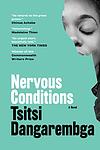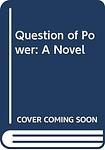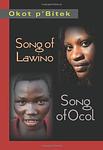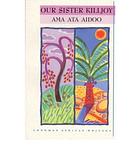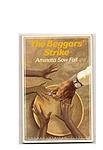The Greatest African "Social & Cultural Fiction" Books of All Time
Click to learn how this list is calculated.
Genres
Social & Cultural Fiction is a literary category that encompasses novels and stories that delve into the complexities of society and culture, exploring themes such as class, race, gender, and identity within specific social contexts. These narratives often provide a lens through which readers can examine the intricacies of human relationships and the impact of cultural norms and societal structures on individuals and communities. By offering a fictional yet reflective portrayal of real-world social dynamics, this genre invites readers to gain a deeper understanding of the diverse experiences that shape our world. Authors in this category frequently use their characters and settings to comment on contemporary issues, challenge prevailing ideologies, and provoke thought about the possibility of social change, making Social & Cultural Fiction a powerful tool for empathy and a mirror for the ever-evolving human condition.
Date Range
Reading Statistics
Click the button below to see how many of these books you've read!
Download
If you're interested in downloading this list as a CSV file for use in a spreadsheet application, you can easily do so by clicking the button below. Please note that to ensure a manageable file size and faster download, the CSV will include details for only the first 500 books.
Download-
1. Things Fall Apart by Chinua Achebe
This novel explores the life of Okonkwo, a respected warrior in the Umuofia clan of the Igbo tribe in Nigeria during the late 1800s. Okonkwo's world is disrupted by the arrival of European missionaries and the subsequent clash of cultures. The story examines the effects of colonialism on African societies, the clash between tradition and change, and the struggle between individual and society. Despite his efforts to resist the changes, Okonkwo's life, like his society, falls apart.
-
2. Disgrace by J M Coetzee
"Disgrace" is a novel that explores the life of a middle-aged professor in South Africa who is dismissed from his position after having an affair with a student. After losing his job, he moves to the countryside to live with his daughter, where they experience a violent attack that significantly alters their lives. The story delves into themes of post-apartheid South Africa, racial tension, sexual exploitation, and the struggle for personal redemption.
-
3. Cry, the Beloved Country by Alan Paton
"Cry, the Beloved Country" is a novel about a black Anglican priest from South Africa's rural Natal region who embarks on a journey to Johannesburg in search of his sister and son. The priest grapples with the racial injustice and social inequality of apartheid-era South Africa, while his son becomes involved in political activism and is wrongfully accused of a crime. The novel explores themes of love, fear, and social justice, while highlighting the destructive effects of apartheid on the human spirit and the South African landscape.
-
4. Waiting for the Barbarians by J M Coetzee
The novel is set in a small frontier town of an unnamed empire, where the magistrate lives a life of civil service and relative peace. His world is disrupted when the Empire declares a state of emergency due to rumors of barbarian uprising. The magistrate becomes a critic of the Empire's brutal and inhumane methods of dealing with the perceived threat, which leads to his arrest and torture. As he tries to understand his role in the vast political machinery, he also grapples with questions of power, justice, and humanity.
-
5. Season of Migration to the North by Al-Tayyib Salih
The novel is a post-colonial exploration of the complex relationship between the East and the West. It tells the story of a young man who returns to his village in Sudan after studying in Europe, only to find that a new villager, a man who has also spent time in the West, has brought back with him a very different perspective on the relationship between the two cultures. The story unfolds as a gripping psychological drama, filled with themes of identity, alienation, and the clash of cultures.
-
6. Half of a Yellow Sun by Chimamanda Ngozi Adichie
The novel is set in Nigeria during the Biafran War, exploring the impact of the conflict on the lives of its characters. The story is told from the perspective of three characters: a young houseboy, a radical university professor, and the professor's wealthy lover. The narrative delves into themes of love, race, and war, offering a vivid depiction of the horrors of conflict and the resilience of the human spirit.
-
7. Nervous Conditions by Tsitsi Dangarembga
"Nervous Conditions" is a semi-autobiographical novel set in colonial Rhodesia in the 1960s. The story follows a young girl from a poor family who gets the opportunity to receive an education after her brother's death. Despite the struggles she faces - including culture shock, racism, and the inherent sexism in both her native and adopted cultures - she perseveres and manages to succeed. The novel explores themes of race, colonialism, and gender through the lens of a young African woman's coming-of-age story.
-
8. The Famished Road by Ben Okri
The novel centers around the life of an abiku, a spirit child, who resides in the bustling city of Lagos. Despite numerous attempts to return to the spiritual world, the boy is tethered to the physical realm through the love of his mother. As he navigates through the political unrest and poverty of post-colonial Nigeria, he experiences a series of surreal and mystical encounters, all while wrestling with the pull of the spirit world. The narrative is a blend of reality and the supernatural, providing a unique perspective on the struggles and complexities of human life.
-
9. Americanah by Chimamanda Ngozi Adichie
The novel follows a young Nigerian woman who emigrates to the United States for a university education. While there, she experiences racism and begins blogging about her experiences as an African woman in America. Meanwhile, her high school sweetheart faces his own struggles in England and Nigeria. The story is a powerful exploration of race, immigration, and the complex nature of identity, love, and belonging.
-
10. So Long a Letter by Mariama Bâ
"So Long a Letter" is an epistolary novel that explores the life of a recently widowed woman in Senegal. Throughout the story, she reflects on her life, her marriage, her husband's second, younger wife, and the status of women in Senegalese society. The book delves into themes of polygamy, friendship, and the struggle for women's rights in a predominantly patriarchal society. It is a poignant examination of the personal and cultural conflicts faced by women in post-colonial Africa.
-
11. A Grain Of Wheat by Ngugi wa Thiong'o
"A Grain of Wheat" is a historical novel set in Kenya during the Mau Mau uprising against British colonial rule. The story follows a diverse cast of characters whose lives are intertwined by secrets, betrayals, and sacrifices. As Kenya prepares for independence, the book explores themes of nationalism, identity, and the complex aftermath of revolution. Through vivid storytelling, the author delves into the complexities of human nature and the struggle for freedom in a turbulent time.
-
12. Burger's Daughter by Nadine Gordimer
"Burger's Daughter" is a novel centered around Rosa Burger, a white woman in South Africa during the apartheid era. The narrative delves into Rosa's life and struggle to find her identity, while also dealing with the legacy of her parents who were anti-apartheid activists. This story provides a deep look into the political and social climate of South Africa during a time of racial segregation and oppression.
-
13. God's Bits of Wood by Ousmane Sembène
This novel tells the story of a railway strike on the Dakar-Niger line that lasted from 1947 to 1948. The workers endure low wages and dangerous conditions, while their French bosses live comfortably. The strike is initially led by men, but as it drags on and hardship intensifies, the women of the community play an increasingly vital role, culminating in a triumphant march where they demand equal rights and recognition. The book explores themes of colonialism, gender roles, and the struggle for equality.
-
14. The Story Of An African Farm by Olive Schreiner
The book is a pioneering work in feminist literature, set in the harsh and arid South African veld in the late 19th century. It follows the lives of two English children, Lyndall and Waldo, who live on a farm and grapple with the constraints of their isolated environment. The narrative explores themes of gender, race, and colonialism, as the characters confront the societal expectations and limitations placed upon them. Through their struggles and relationships, the story delves into existential questions and the search for personal freedom, challenging the traditional roles and beliefs of the time.
-
15. A Question of Power by Bessie Head
"A Question of Power" explores the life of Elizabeth, a mixed-race South African woman who moves to a village in Botswana to escape the apartheid regime of her home country. The novel delves into her struggle with mental illness, as she experiences vivid, often terrifying hallucinations. These episodes are deeply symbolic, reflecting her internal battles with power, gender, race, and colonialism. The narrative provides a profound examination of the human psyche and the impact of social and political oppression on mental health.
-
16. July's People by Nadine Gordimer
"July's People" is a novel set in a hypothetical future where South Africa's apartheid system has collapsed and the nation is embroiled in a brutal civil war. The story follows a liberal white family who, fleeing the violence, are taken in by their black servant, July, in his rural village. The book explores the power dynamics and complexities of their relationship, as they navigate this new reality where traditional roles are reversed, and grapple with issues of race, class, and privilege.
-
17. A Dry White Season by Andre Brink
Set in apartheid-era South Africa, "A Dry White Season" follows the story of Ben Du Toit, a white schoolteacher who becomes involved in the fight against the system after his gardener's son is brutally beaten by the police. As he delves deeper into his quest for justice, he becomes increasingly isolated from his community and his family, and ultimately pays the highest price for his convictions. The novel is a powerful exploration of the devastating effects of racial injustice and the courage it takes to stand against it.
-
18. Second-class Citizen by Buchi Emecheta
"Second-Class Citizen" is a poignant narrative about a young Nigerian woman, Adah, who dreams of getting an education and moving to the United Kingdom. Despite cultural and societal obstacles, Adah manages to achieve her dream but is met with more hardship as she faces racial discrimination, an abusive marriage, and the struggle of raising five children in a foreign land. Through her resilience, she continues to strive for a better life, depicting the struggles of immigrants and the strength of women.
-
19. Song Of Lawino by Okot P'Bitek
"Song of Lawino" is a powerful and poignant narrative poem that explores the cultural clash between traditional African values and the influence of Westernization. The protagonist, Lawino, passionately expresses her anguish and frustration as she witnesses her husband, Ocol, abandon his African roots and embrace Western ideals. Through vivid imagery and captivating storytelling, the book delves into themes of love, betrayal, and the consequences of cultural assimilation, ultimately offering a thought-provoking commentary on the complexities of cultural identity.
-
20. Our Sister Killjoy by Ama Ata Aidoo
This novel explores the journey of a young African woman who travels to Europe on a scholarship, only to confront the stark realities of neocolonialism and the African diaspora's experiences in the West. Through her eyes, readers are exposed to themes of identity, alienation, and the complexities of cultural assimilation. The protagonist's observations and interactions challenge the romanticized views of Europe, offering a critical examination of the impacts of colonialism and the ongoing struggle for self-definition and autonomy among Africans both at home and abroad. The narrative is a poignant critique of postcolonial society, delivered through a blend of prose and poetry that captures the protagonist's internal and external conflicts.
-
21. The Beggars' Strike by Aminata Sow Fall
The novel is a satirical exploration of a West African city where the local government decides to rid the streets of beggars, only to find that their absence disrupts the social order. The city's residents, who once relied on giving alms to the beggars as a means of securing their own spiritual salvation, are thrown into a moral crisis. The beggars, organized by a shrewd and charismatic leader, leverage their importance in the community and initiate a strike, refusing to accept alms, which leads to unforeseen consequences for the city's economy and the citizens' sense of identity. The story delves into themes of power, tradition, and the complex role of beggary in society, challenging the readers' perceptions of charity and social justice.
-
22. Miramar by Naguib Mahfouz
Set in 1960s Egypt, "Miramar" tells the story of an aging revolutionary, a rich man's daughter, a corrupt journalist, and a real estate agent who all come to reside at the Miramar Pension in Alexandria. Their lives intertwine with the life of the young peasant woman who works there as a maid, and through their interactions, the novel explores themes of social and political change in Egypt, the struggle between old and new, and the power of the individual to shape their own destiny.
-
23. Midaq Alley by Najib Mahfuz
Set in an old Cairo neighborhood during World War II, the novel delves into the lives of the residents of a bustling alley, offering a tapestry of human experiences and social issues. Through the stories of a diverse cast of characters, including a young beauty dreaming of a better life, a wealthy businessman seeking love, a cafe owner yearning for his past, and others, the narrative explores themes of love, ambition, and the struggle for personal fulfillment. The alley serves as a microcosm of society, reflecting the larger cultural and political changes occurring in Egypt at the time, and the characters' intertwined lives illustrate the complexities of human nature and the universal quest for happiness and meaning.
-
24. The Joys Of Motherhood by Buchi Emecheta
"The Joys of Motherhood" is a poignant and powerful novel that explores the life of Nnu Ego, a Nigerian woman who struggles to find fulfillment and happiness in the traditional role of motherhood. Set against the backdrop of colonial Nigeria, the story delves into themes of gender inequality, cultural expectations, and the sacrifices mothers make for their children. Through Nnu Ego's experiences, the author offers a thought-provoking examination of the complexities and contradictions of motherhood in a rapidly changing society.
-
25. La Grande Maison by Mohammed Dib
"La Grande Maison" is a novel that delves into the struggles and hardships of life in Algeria during the early 20th century, particularly focusing on the impact of colonialism. The story is told through the eyes of a young boy named Omar, who grows up in a large, impoverished family in a small Algerian village. As Omar navigates his childhood and adolescence, he becomes increasingly aware of the social and economic disparities that define his world, grappling with his aspirations for education and a better life against the backdrop of political upheaval and the fight for independence from French colonial rule. The novel poignantly captures the complex interplay of personal and political conflicts, portraying a community caught between tradition and change.
Reading Statistics
Click the button below to see how many of these books you've read!
Download
If you're interested in downloading this list as a CSV file for use in a spreadsheet application, you can easily do so by clicking the button below. Please note that to ensure a manageable file size and faster download, the CSV will include details for only the first 500 books.
Download





